Insiders benefit from Dade program to sell homes of incapacitated people. Only a few knew
Termite damage, broken windows, a bad roof and moldy interior didn’t scare off Gallego Homes from the 1950 house the Guardianship Program of Dade County was selling on behalf of an 87-year-old woman who had moved into a nursing home years earlier.
Gallego paid $235,000 for the South Miami property, gutted it, added quartz countertops and impact windows and sold it in October 2018 for $435,000, nearly doubling the value in eight months.
It was a classic fix-and-flip strategy that paid off for Gallego, but the nonprofit Guardianship Program only gave a small number of potential buyers the chance to roll the real estate dice.
The property wasn’t listed for sale online, according to a search of the Multiple Listing Service, the prime source for real estate agents and house hunters in the Miami area. Gallego’s contract lists no real estate agent for the buyer, only the name of the agent representing the Guardianship Program, a nonprofit that makes financial decisions for people declared incapacitated by the court system.
Gallego’s two corporate officers at the time — President Margarita Méndez and her daughter, Victoria Méndez, who has been Miami’s city attorney since September 2013 — were known to the Guardianship Program before the sale. Both appeared on a 2012 email from a Guardianship Program staff member to 16 potential buyers offering up a Hialeah house that eventually went to Express Homes for $52,000.
Express is owned by Carlos Morales, Victoria Méndez’s husband and a frequent buyer from the Guardianship Program, with at least 16 purchases since 2010, according to property records.
The Guardianship Program’s real estate deals are now under county investigation. The nonprofit last week agreed to suspend property sales as a condition for Miami-Dade Mayor Daniella Levine Cava agreeing to resume payments from the $2.7 million funding stream in the county’s 2023 budget for a charity representing about 1,400 people deemed unable to make decisions for themselves.
READ MORE: City attorney’s husband bought a house that had $271,250 in fines. Now there’s a lawsuit
Levine Cava froze the funding following a report by the Miami Herald’s partner WLRN on the real estate sales by the charity, which relies on county and state dollars for a budget topping $6 million and a staff of 60 people.
The WLRN story reported on a string of Guardianship Program properties that Express Homes bought and then sold at higher values — usually after renovations, but twice the second sales occurred within 24 hours of the original purchase from the nonprofit. WLRN also noted the law firm of Sergio Mendez, a former Guardianship Program board president who is not related to Victoria Méndez, did legal work for Express Homes in some of the transactions.
In a March 26 letter to Carlos McDonald, the Guardianship Program’s executive director, Levine Cava demanded the nonprofit “put in place reforms to create additional safeguards surrounding the sales of private homes to ensure that the Guardianship Program’s mission is properly met and public trust in the program and your work can be restored.”
McDonald declined to be interviewed for this article. In a March 14 email to probate lawyers seeking support after the WLRN story, McDonald said coverage of the charity has “at best been incomplete” and lacking context.
“Most know first-hand many GPDC staff personally and hopefully have seen up close their genuine commitment,” McDonald wrote to members of the Miami-Dade Bar Association’s Probate and Guardianship Committee. “We ask only for your continued confidence and trust.”
He said only 3% of the more than 4,000 clients served by the Guardianship Program since 2012 involved selling real estate. Those transactions had “dozens of different buyers, multiple appraisers and multiple Realtors.”
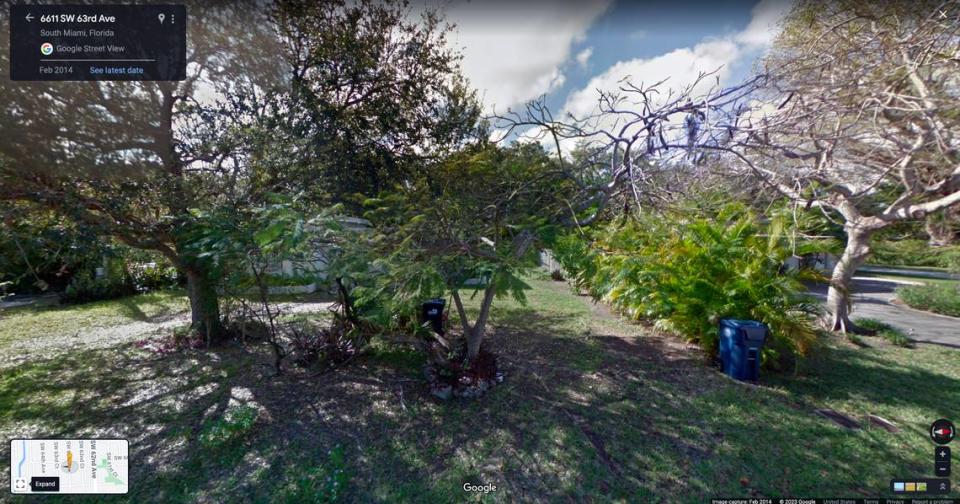
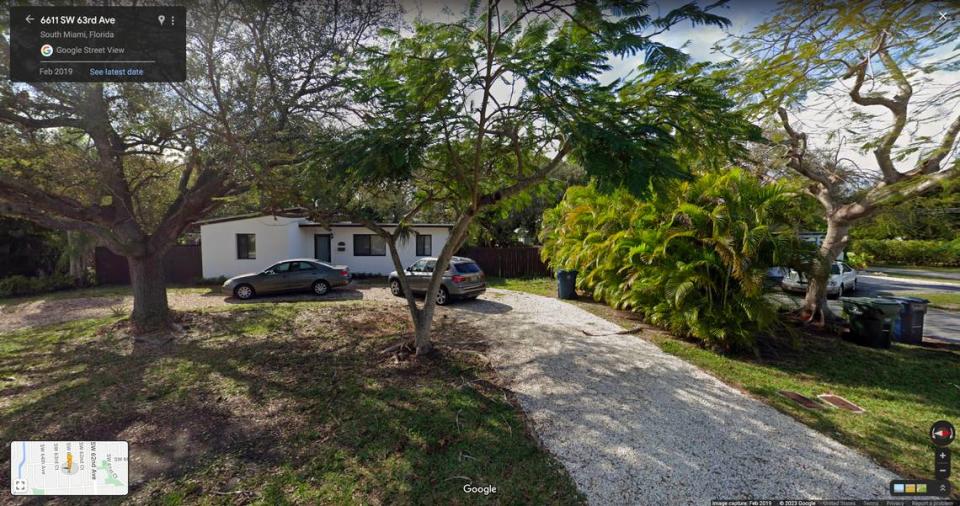
A small network of real estate agents
A defense of the Guardianship Program’s real estate practices did come from Matthew Ladd, a lawyer representing Morales. Ladd noted he couldn’t speak for the nonprofit, but said sometimes the Guardianship Program puts more of a premium on selling a property quickly than marketing it widely. Reasons include, Ladd said, mounting costs or potential enforcement actions on a property that make a quick sale the best option for the incapacitated person, also known as a ward.
“The process in place allows for an experienced Realtor, who is on a pre-approved list, and selected at random, to list the properties or otherwise find cash buyers who might be interested in rescuing the ward from an impending tax sale, foreclosure, or hazardous condition of their homes. Appraisers are also appointed to determine the value,” Ladd said in an email Sunday to the Herald.
“Once the value is determined, the properties are usually listed or otherwise put on the market, an offer is selected and approved by an independent judge. If there isn’t time to list the property because of an imminent foreclosure sale or tax deed, the program will do the best it can with the time it has to help the ward get the most it can,” he said.
READ MORE: Here’s a closer look at how one Guardianship transaction unfolded
In a motion asking a judge to approve the 2018 sale of the South Miami house to Gallego Homes for $5,000 below the appraised value, a Guardianship Program lawyer said the property was scheduled for city demolition after multiple code violations. According to a contract obtained by the Herald but not included in court files, a second offer came in at $225,000 for the South Miami property, $10,000 less than what Gallego Homes paid for it.
Victoria Méndez said while she was on the corporate papers for her mother’s company, she wasn’t involved in the transactions.
“I was on Gallego Homes for estate planning purposes as her only daughter. I always disclosed Gallego Homes on my City of Miami financial disclosure forms,” she wrote. “My mother has not purchased anything in years since she was slowing down due to her age and health.”
An examination of court files, online property information and real estate listings shows the Guardianship Program frequently offered real estate for sale quietly, lacking the kind of open-market approach that industry veterans say maximizes the chances of getting top dollar for sellers.
The Guardianship Program sells property after court approval, with the proceeds going into funds a judge oversees to help pay for an incapacitated person’s care, along with Social Security, Medicaid and other income sources that often cover nursing-home bills.
The Herald’s review found:
Guardianship Program sells houses, but who knows about them?
Last July, Express Homes paid $245,000 for a Miami Beach condominium owned by a 92-year-old woman represented by the Guardianship Program. Express still owns the one-bedroom unit, now valued at $310,000, according to the Miami-Dade Property Appraiser’s Office. There’s no record of it being posted on the Miami Association of Realtors’ Multiple Listing Service (MLS) ahead of the Express purchase through the court system.
Seven months earlier, Express Homes paid $430,000 through the Guardianship Program for a Kendale Lakes home belonging to an 86-year-old woman living in a Miami Beach nursing home. The Multiple Listing Service shows the house was not listed before the January 2022 sale.
Once Express Homes rehabbed the four-bedroom house, a listing did show up in May ahead of the property’s $695,000 sale that summer.
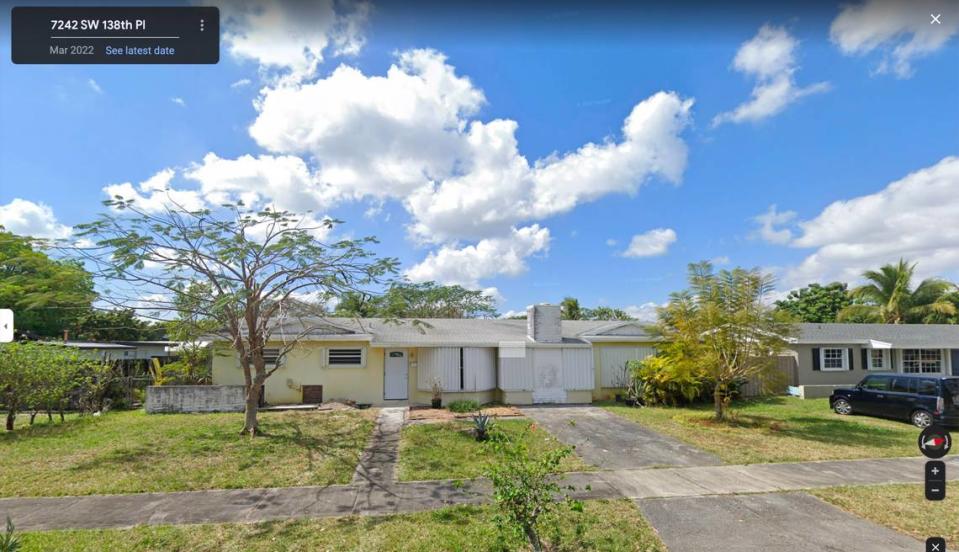
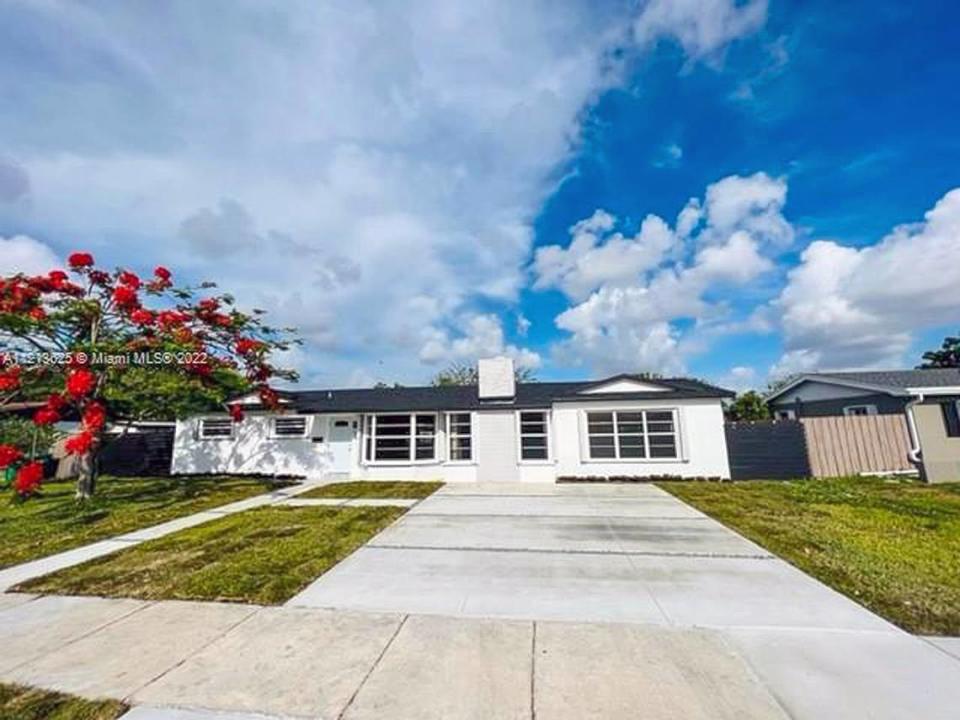
In June 2019, a licensed contractor named Jose Gonzalez paid $300,000 for a vacant lot in Miami’s Highland Park neighborhood. It wasn’t listed for sale before the Guardianship Program sold it to Gonzalez. After the sale, the MLS database shows it was listed in late September with a $650,000 asking price. The lot sold in the spring of 2020 for $400,000.
A seller can’t expect top dollar without listing a property on the open market, said Christina Pappas, president of the Miami-based Keyes Company, one of the largest independent real estate brokerages in Florida.
“To get the most money possible, you want to expose it as much as possible. You want as many eyeballs as possible,” she said. “If you haven’t taken it to market, do you really know what the market price is?”
A guardian is given authority to request court permission for big decisions like where the person should live, and when it’s appropriate to sell off real estate or other assets.
“A one-sentence explanation is: You’re the parent of an adult,” McDonald said in a 2022 interview with the Florida State Guardianship Association. “You do everything for the adult a parent would do for their own child. Such as helping them with room and board. Healthcare needs … It’s hard work. It’s definitely 24-7.”
Some Guardianship Program sales did involve real estate agents listing the properties on the MLS and inviting offers from any interested buyer.
“Westchester handyman special. This is a probate sale and is cash only,” read the MLS listing from one Guardianship Program sale in 2014, where a three-bedroom house off the Palmetto Expressway sold for $575,000. “Property needs some updating but has plenty of living area.”
Pappas, the Keyes Company president, said properties in disrepair often rely on a listing agent’s connections with would-be investors because the average buyer generally isn’t prepared for the upfront investment required for repairs.
“You have a smaller pool when it comes to investors,” she said. “Many Realtors will look within their brokerage for that investor or within their contacts.”
Even so, Pappas said it generally makes sense to list a property on as many websites as possible no matter the condition, unless the seller has personal reasons to keep the sale quiet.
“To maximize the dollars for your property,” she said, “we need to get as many people through the door and looking at your property as possible.”
Multiple offers from related buyers
On Aug. 2, 2012, the Guardianship Program sold an 83-year-old man’s Hialeah house to Express Homes for $52,000. Also that day, Express Homes recorded its own sale of the three-bedroom house to Lorenzo Homes for $64,000, as first reported by WLRN.
The sale got its start in the spring, when a Guardianship Program staff member sent an email to 16 people with the subject “Property for sale.” It set a deadline for April 2, 2012, for bids to come in.
The email illustrates how the Guardianship Program sold property when it wasn’t listed on the open market: It had a list of potential investors willing to consider quick purchases of rundown properties.
One response came from Victoria Méndez, then deputy city attorney in Miami, writing from a personal email address. “Unfortunately,” Méndez wrote, ”this property has too much damage to even consider. Please keep us in the loop on any other properties coming up. Thanks.”
Margarita Méndez wrote with an offer of $40,000 from her own personal email account. Then Victoria Méndez’s husband, Carlos Morales, came in with the winning bid at $52,000 in his own email.
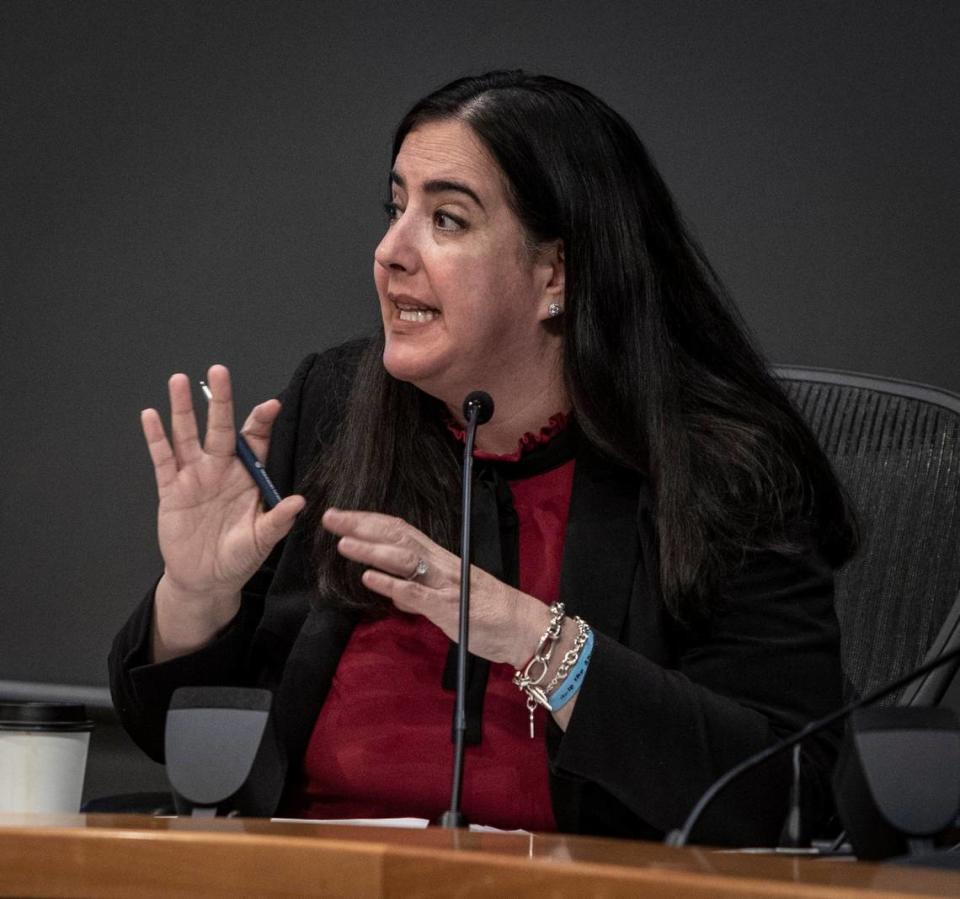
In an email, Victoria Méndez said she didn’t remember the email exchange from more than a decade ago, but thinks she was added to the program’s email list after meeting an administrator at the nonprofit.
“I barely remember what I did yesterday, let alone 11 years ago, but I think I met the old executive director at an event one day,” she wrote. “I think he added me to the list serve. I do not remember getting too many of these. I did not purchase anything from the Guardianship Program.”
Once Express Homes proceeded with the purchase and quick flip to Lorenzo Homes, the lawyer who prepared both sales documents was the future Miami mayor, Francis Suarez, as WLRN first reported. At the time, Suarez, a real estate lawyer, was a city commissioner. The next year, his vote made the difference in Victoria Méndez’s promotion to city attorney in a 3-2 decision by the City Commission on Sept. 12, 2013. WLRN reported Suarez was also on real estate papers for two other Express Homes purchases from the nonprofit.
Suarez’s past work as a title attorney was not “in any way related to or relevant to his official duties,” according to a statement from Suarez spokesperson Soledad Cedro. Suarez’s “vote to hire Victoria Méndez as City Attorney was based on the merits of the candidates who were being considered,” the statement read.
An appraiser becomes owner of former Guardianship property
In 2015 the Guardianship Program needed to show a judge an appraisal before selling the Miami home of a 92-year-old woman in a nursing home to Gallego Homes.
Antonio Lorenzo of 1st Class Appraisals provided the report, and within a year he owned the three-bedroom house himself, according to property records.
Lorenzo appraised the three-bedroom house for $34,000. Gallego Homes bought it for $31,000 on Oct. 7, 2015, then sold it a month later to Maia Investments for $30,000. On the last day of 2015, Maia Investments transferred the property to Antonio Lorenzo in a quit-claim deed transaction for $100.
The property records don’t show why Maia would give up the real estate to Lorenzo, but the company is owned by the president of Lorenzo Homes, Antoliano Lorenzo. It wasn’t clear if the two Lorenzos are related, but both are listed on the corporate papers of 784 Investment LLC.
Antoliano Lorenzo formed the company in 2016, and 784 Investment LLC now owns the house. The company gets its mail at Antonio Lorenzo’s home address in a Miami suburb.
On Jan. 9, 2013, the Guardianship Program sold Express Homes a North Miami home belonging to an 89-year-old woman. Express Homes paid $190,000 for the property, then sold it the same day for $240,000 to a company called Secure Funding Group LLC. Antonio Lorenzo is one of the officers listed on the company’s corporate filings that year.
Nearly a decade later, Express Homes purchased another home from the Guardianship Program, this one a Kendale Lakes house belonging to an 86-year-old woman living in a nursing home. Express purchased it for $430,000. After renovating the property, Express listed it on the MLS in May 2022. Antonio Lorenzo was the listing agent for Express, and the property sold within a month for $695,000.
Antonio Lorenzo did not respond to multiple requests for interviews. Antoliano Lorenzo did not respond to a request for information on the Maia Investments transfer.
Ladd, the lawyer for Morales, said it was the Guardianship Program that hired Lorenzo for the appraisal in the Gallego Homes purchase as part of the nonprofit’s rotation through a pool of appraisers who signed up to do work for the organization. Gallego Homes had nothing to do with the future buyers after the initial sale to Maia, he said. “You buy a property, and you can sell it to anyone you want,” he said.
Challenges, opportunity in rundown real estate
By not listing the South Miami house on the MLS, the Guardianship Program missed out on the house appearing on searches from the industry database that populates real estate hubs like Realtor.com, Redfin and Trulia. The Guardianship Program did sign real estate agent John Moreno to sell the house. The Gallego Homes contract shows there was no agent representing the buyer.
Patrick Weber is a lawyer who oversees guardianship programs in multiple counties, including Collier and Monroe. He said guardianship sales should be open to as many buyers as possible because that’s the only way to get top dollar for the wards who can’t make real estate decisions for themselves. For guardianship sales he’s involved with, that means listing the property for sale to any interested buyer.
“That is the true market value, when you put it on the open market for sale,” he said. “It’s listed on the MLS. We do not do private sales.”
Some other Guardianship Program contracts show real estate agents representing both sides of the sale. That arrangement happens in the real estate industry, brokers said, when a listing agent also locates a buyer. That typically means a double commission, with one agent earning a 3% share for selling the house and a 3% share for bringing the buyer to the table.
When Gallego Homes purchased the South Miami house in 2018 from the Guardianship Program, the property was vacant with a string of problems. An appraiser’s report in the court file described termite damage, broken windows, a faulty roof and mold inside.
Seven years earlier, a state case worker wrote that the owner’s mental issues left her paranoid and making poor decisions.
In a 2012 report, the case worker described finding the woman living in the house without electricity after deciding to stop paying the utility bills. With mold inside and newspapers stacked throughout the living area, the woman lived there “for a month with a broken hip, dragging herself across the floor to move around her home,” the case worker’s report stated, according to a court filing.
The appraisal the Guardianship Program secured for the South Miami transaction, performed by an Edys Fernandez in Hialeah, noted a string of problems: water stains on ceilings, a roof needing replacement, peeling paint, wood rot, and evidence of termites and mold.
While rundown properties typically turn off most buyers, there are still enough investors prowling MLS posts to justify listing even the most problematic house, said Peter Zalewski, owner of the Condo Vultures real estate firm.
“This is the type of property investors would love to get their hands on,” he said of the South Miami house Gallego Homes bought in 2018. “Mold and broken windows are as attractive to an investor as a place with a nice balcony is to a luxury buyer.”
Miami Herald staff writer Joey Flechas contributed to this report.

